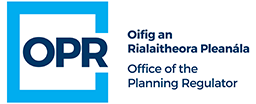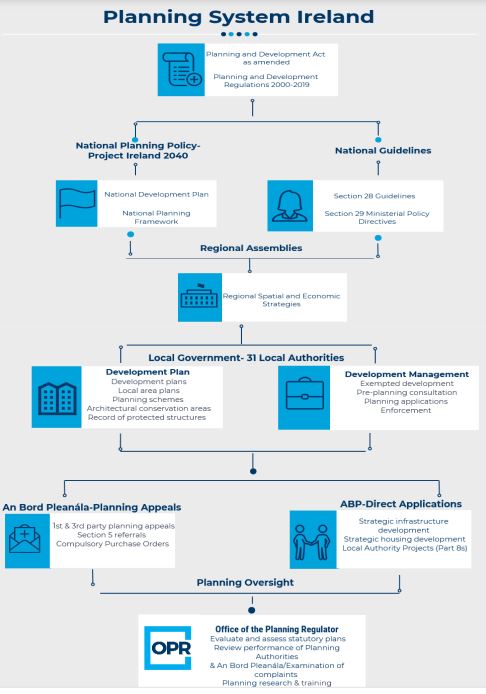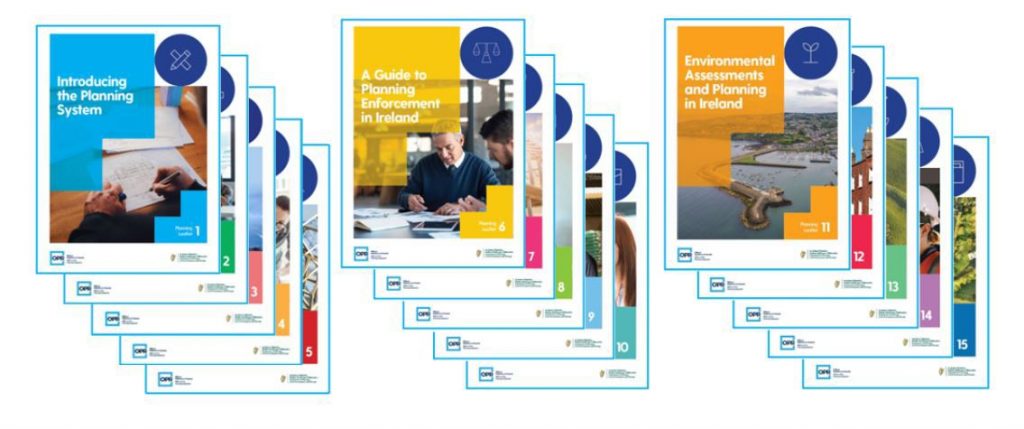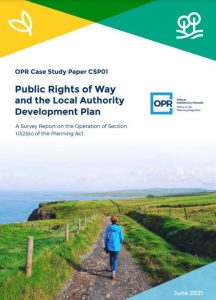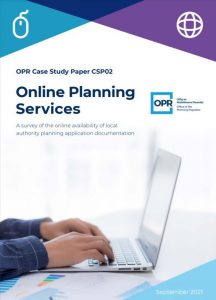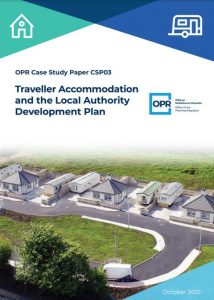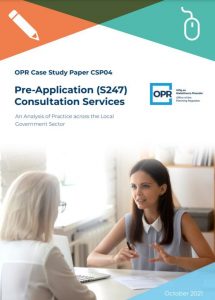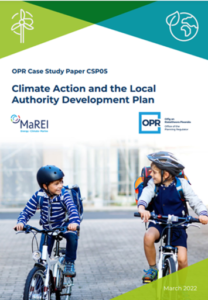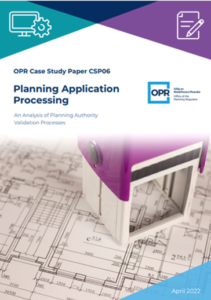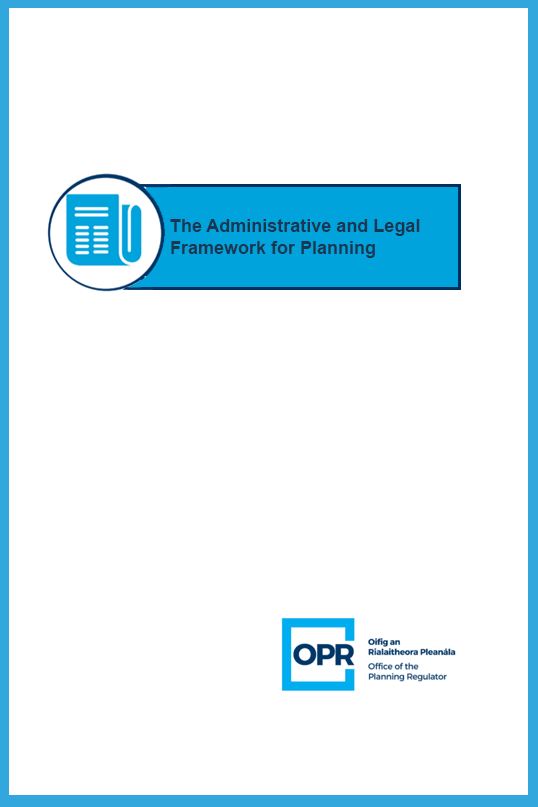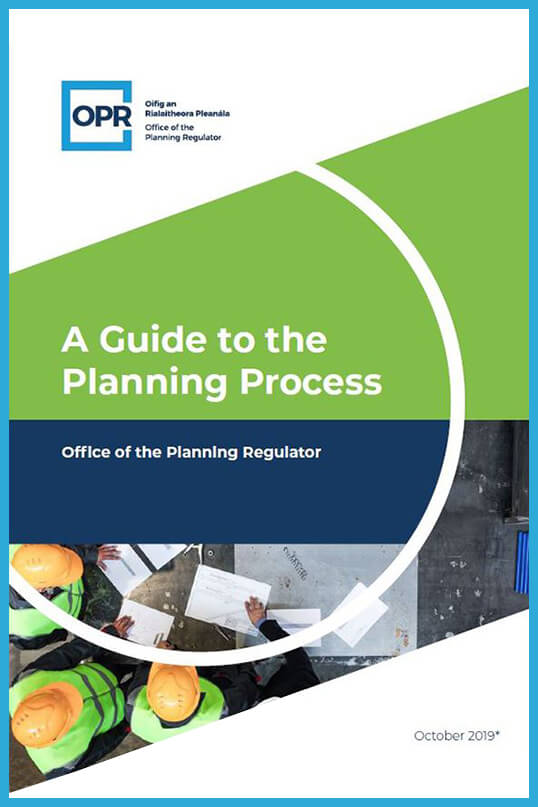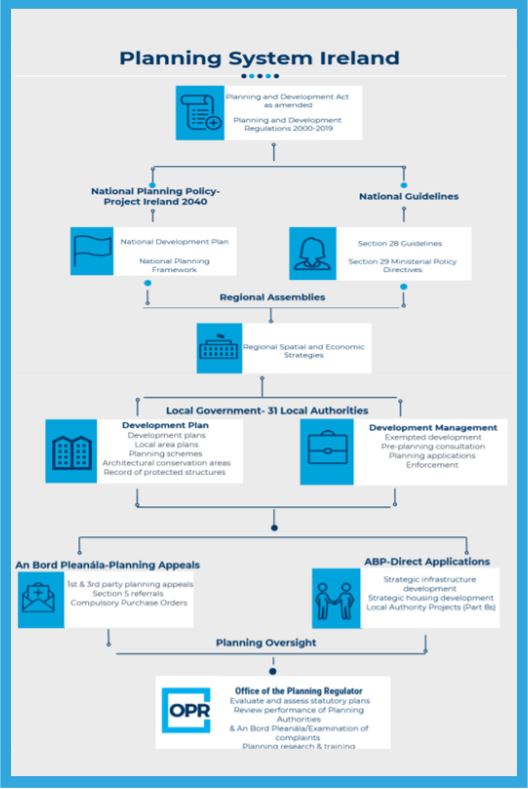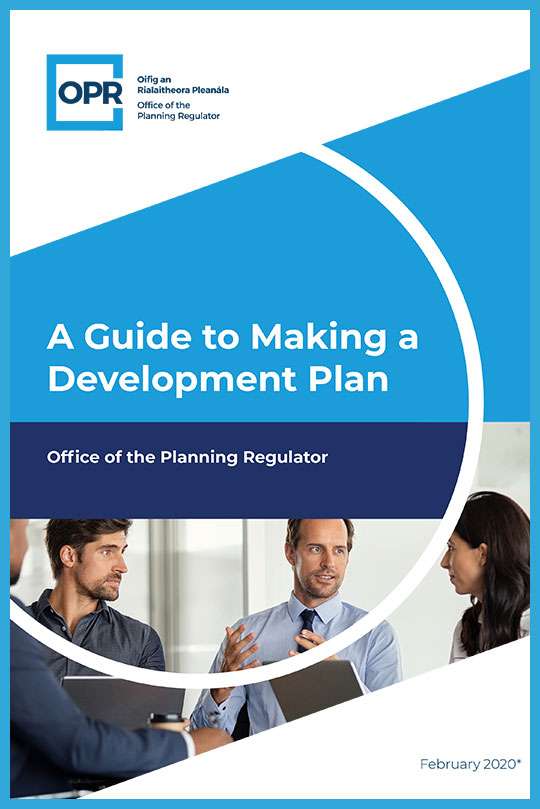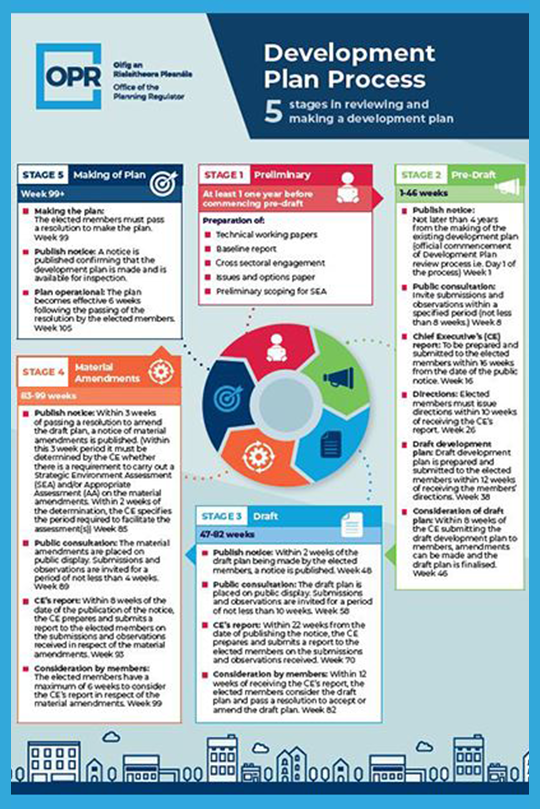Training
Introduction to Planning for Elected Members
Whether you are a newly elected councillor or you just need a refresher on certain aspects of the planning system the information contained herein will help you to understand how the planning system works from the plan-making elements, through to planning applications, planning decisions, appeals, the respective roles of the elected members, the executive, the public and the interrelationships between all stakeholders.
For further information on the role of elected members in the planning process, please visit the ‘Role of Elected Members in Planning‘ page.
Training
Planning System in Ireland
Planning plays an important role in our society. It enables us to make the best use of our resources and allows necessary and worthwhile development to go ahead. It also ensures that the environment and heritage of our towns, cities and countryside is protected. Planning authorities control the location, amount and type of development by making decisions on planning applications. Elected members play an important role in forward planning policy documents such as development plans and local area plans. These documents plan for the proper planning and sustainable development of their local authority.
The hierarchy of plans in Ireland is set out hereunder:
In 2018, the Government published the National Planning Framework (NPF) as part of Project Ireland 2040. It is the overarching policy and planning framework for Ireland’s:
- Social,
- Economic,
- Environmental, and
- Cultural development.
The NPF replaced the National Spatial Strategy as Ireland’s planning framework. The policies in the NPF must be taken into account when preparing Regional Spatial and Economic Strategies (RSES) and development plans.
Regional Spatial and Economic Strategies (RSES) have replaced the Regional Planning Guidelines. The objective of each RSES is to support the NPF and the economic policies and objectives of the government. Each strategy is a long-term planning and economic framework for the development of each region. Ireland is split into three strategic planning areas:
- Eastern and Midland Region,
- Southern Region, and
- Northern and Western Region.
These regions are governed by regional assemblies. Regional assemblies consist of members of the local authorities within the region. The regional assembly adopts the RSES.
The development plan is the main public statement of planning policies for your local community. It sets out the land use, amenity and development objectives and policies of the planning authority, for a six-year period. The plan consists of a written statement of objectives and includes maps that give a graphic representation of how your city/county will develop and improve in a sustainable way in the six-year period. The core strategy of the plan shows that the plan is consistent with the National Planning Framework (NPF) and Regional Spatial Economic Strategy (RSES) policies.
Elected members (councillors) are responsible for making, reviewing and varying the development plan. It is their duty to adopt the plan with the technical help of their officials (the chief executive, planners, etc.). Public consultation on the plan must also be carried out.
A Local Area Plan (LAP) provides more detailed planning policies for areas where significant development and change is anticipated. A LAP must be compatible with national and regional guidance documents and the core strategy and policies of the development plan. A LAP is valid for six years from the date it is adopted by the planning authority.
Role of the OPR
The Office of the Planning Regulator (OPR) was established in April 2019 on foot of recommendations made by the Tribunal of Inquiry into Certain Planning Matters and Payments (the Mahon Tribunal). Our role is to ensure that local authorities and An Bord Pleanála support and implement Government planning policy.
We also conduct planning research and training and promote public awareness of planning in order to encourage the public’s engagement in the planning process and to enhance knowledge and public information about planning in Ireland.
These videos were prepared to provide more information about the OPR’s role and the work carried out by the various teams in the organisation please take a few minutes to watch them:




Planning Leaflets
The OPR and the Department of Housing, Local Government and Heritage published a series of planning leaflets, in early 2021, dealing with all aspects of the planning system. These leaflets were revised and updated in 2022 and cover a wide range of issues including how to prepare and lodge a planning application, how to make a planning appeal, requirements for change of use, building extensions, garages, domestic sheds, agricultural development, etc. The leaflets can be accessed free of charge by clicking on the cover images opposite. They are also available from your local planning authority. The leaflets will be updated on a regular basis to take account of changes in legislation and policy.
Research Publications
Under Section 31Q of the Planning and Development Act, as amended, the OPR has a statutory remit to conduct research. The OPR has to date, authored and published a series of Case Study Papers (CSPs) which fall under the ‘Planning Performance’ and ‘Planning Issues’ Strands of our Planning Research Framework. For further information regarding completed and ongoing research undertaken by the OPR, please visit our Research page.
The topics covered in the CSPs include: Public Rights of Way, Online Planning Services, Traveller Accommodation in Development Plans, Pre-Application Consultation Services, Climate Action and the Local Authority Development Plan and an Analysis of Planning Authority Validation Processes. Please click on the cover images to access the published CSPs.




The Planning Process
The OPR has created an online ‘Planning Process’ resource to provide easy access to information on the three key stages of the planning application process. These three key stages are the ‘Pre-Application Consultation’ stage, the ‘Planning Application’ stage and the ‘Planning Decisions and Appeals’ stage. This resource houses animated explainer videos, flowcharts, links to planning authority online resources and planning leaflets, which are designed to help you navigate your way through the planning system.
Please take few minutes to watch the animated explainer videos opposite and visit the ‘Planning Process’ page for further information.
